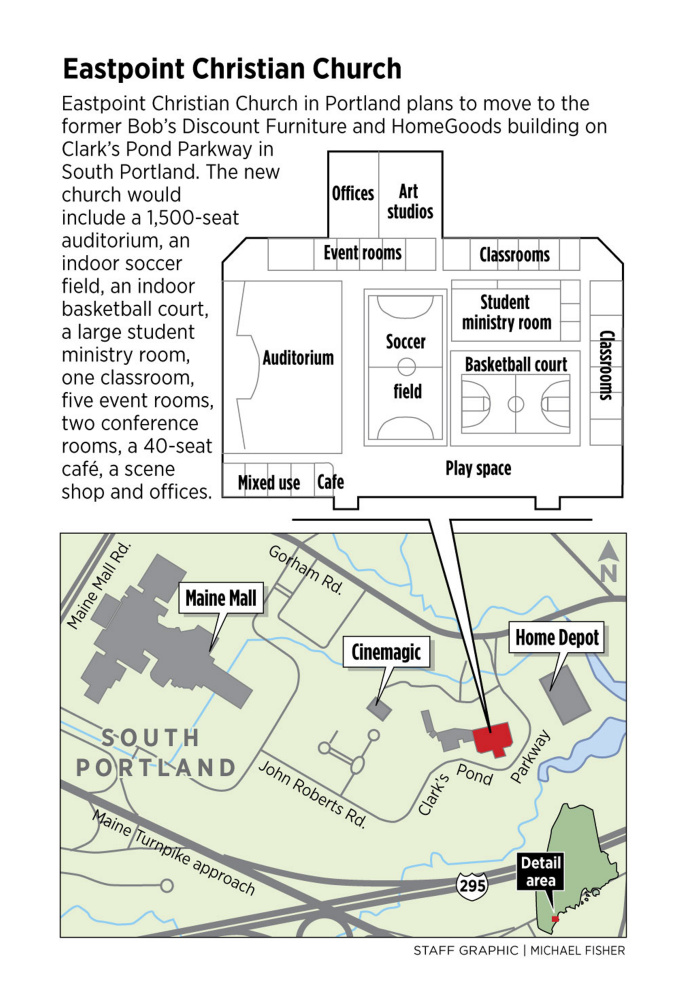SOUTH PORTLAND — The fast-growing Eastpoint Christian Church in Portland plans to move into two vacant big-box stores in a shopping plaza near the Maine Mall.
The unexpected location – in the former Bob’s Discount Furniture and HomeGoods building on Clark’s Pond Parkway – is one of many surprising aspects of the planned church.
The 92,000-square-foot building near a Home Depot and a Cinemagic movie theater would be six times larger than its current location, a 15,000-square-foot former DHL warehouse at 58 City Line Drive in Portland, near the Portland International Jetport.
The church plans to spend $7 million to buy the building and nearly six acres of land, and even more to convert the former big-box stores into a “community center with a church inside,” including a 1,500-seat auditorium, an indoor soccer field, an indoor basketball court and a 40-seat cafe.
Eastpoint’s pastors say they’re designing a newer style of church that’s meant to be totally engaged with the wider community and active seven days a week, not just on weekends. They were inspired when they recently visited the 242 Community Church in Brighton, Michigan. They walked in and saw sports news on big-screen TVs, a soccer field, a cross-fit center, a children’s play space and activity everywhere.
“They were offering the building as a gift to the community and that’s what we want to do,” said Kurt Holmgren, Eastpoint’s outreach pastor. “We could probably satisfy the needs of our church with 50,000 square feet, but we want to be more for the community.”
Eastpoint, a non-denominational, Bible-based church, has a purchase-and-sale agreement to buy the property. The project is allowed under city zoning and is on track for minor subdivision and site plan review by the Planning Board on May 10. Renovations would start in June and the church would move into the new space as early as February 2017, Holmgren said.
Eastpoint’s growth is unusual in Maine, which consistently ranks among the least religious states in America, along with the rest of New England. According to the Pew Research Center, only 34 percent of Mainers say religion is important in their lives and 22 percent say they attend worship services at least weekly.

The proposed Eastpoint Christian Church on Clark’s Pond Parkway in South Portland will create “a community center with a church inside” that is active seven days a week. Courtesy Dwight M. Herdrich Architecture + Design
ADDING FOURTH SUNDAY SERVICE
Founded in 2004, Eastpoint’s following has tripled over the last five years, growing from 300 to 1,200 weekly attendants at its current address, including 120 middle and high school students, Holmgren said. It gradually outgrew three previous leased locations in South Portland and Scarborough. About 2,200 people attended Easter services last weekend and the church is adding a fourth service to its regular schedule this Sunday.
“We’re sort of bulging out of this space,” Holmgren said.
Lead Pastor Scott Taube credits the church’s growth to building relationships.
“It’s providing a place for people to come and be part of the community,” Taube said. “It’s based on our faith. Jesus is at the center of our community. The key for us is to help people know Jesus.”
Eastpoint considered moving to other locations in Portland, South Portland and Westbrook before settling on the former Bob’s and HomeGoods building, which is empty because the stores recently moved to new buildings at 700 Gallery Boulevard in Scarborough.
As communities across the United States increasingly deal with vacant big-box stores, it’s not uncommon to see them converted into churches, said Sarah Schindler, a land use and real estate law professor at the University of Maine School of Law. She wrote an article, “The Future of Abandoned Big Box Stores: Legal Solutions to the Legacies of Poor Planning,” which was published in the University of Colorado Law Review in 2012.
“Churches are definitely some of the uses we see going in, along with bowling alleys, libraries, municipal offices and schools,” Schindler said. “There aren’t many uses that can fill a space that big. It can be very expensive to redevelop these spaces and they really weren’t built to last.”
‘A STEP OF FAITH’
The land and building at 333 Clark’s Pond Parkway are owned by CPSP LLC, a company held by Joseph Soley of Portland, according to the church’s proposal. Part of a larger shopping plaza, the property has an assessed value of about $5.4 million and a yearly tax bill of about $93,960, according to the city assessor’s records. As a church, the property would no longer be subject to taxes.
Currently, 10 of the 13 storefronts in the shopping plaza appear to be empty.
The church project is being financed through The Solomon Foundation, a nonprofit investment group in Parker, Colorado, that helps to establish Christian churches and ministries.
Exactly how much the church would borrow depends on the extent of renovations necessary and how much can be raised in donations, including corporate contributions, Holmgren said. Creating indoor soccer and basketball spaces would require costly removal of interior pillars.
Plans for the new church also show a large student ministry room, 11 classrooms, five event rooms, two conference rooms, a 40-seat café, a scene-building shop and offices. The 1,500-seat auditorium, where church services would be held, would accommodate nearly four times as many people as the current worship space. It would feature a stage equipped with the latest performance-level lighting and sound equipment.
The church set up an email address – ideas@eastpoint.church – to seek input from the wider community.
“This is a step of faith for us,” Holmgren said. “But we really believe this is the direction God wants us to go.”
Send questions/comments to the editors.



